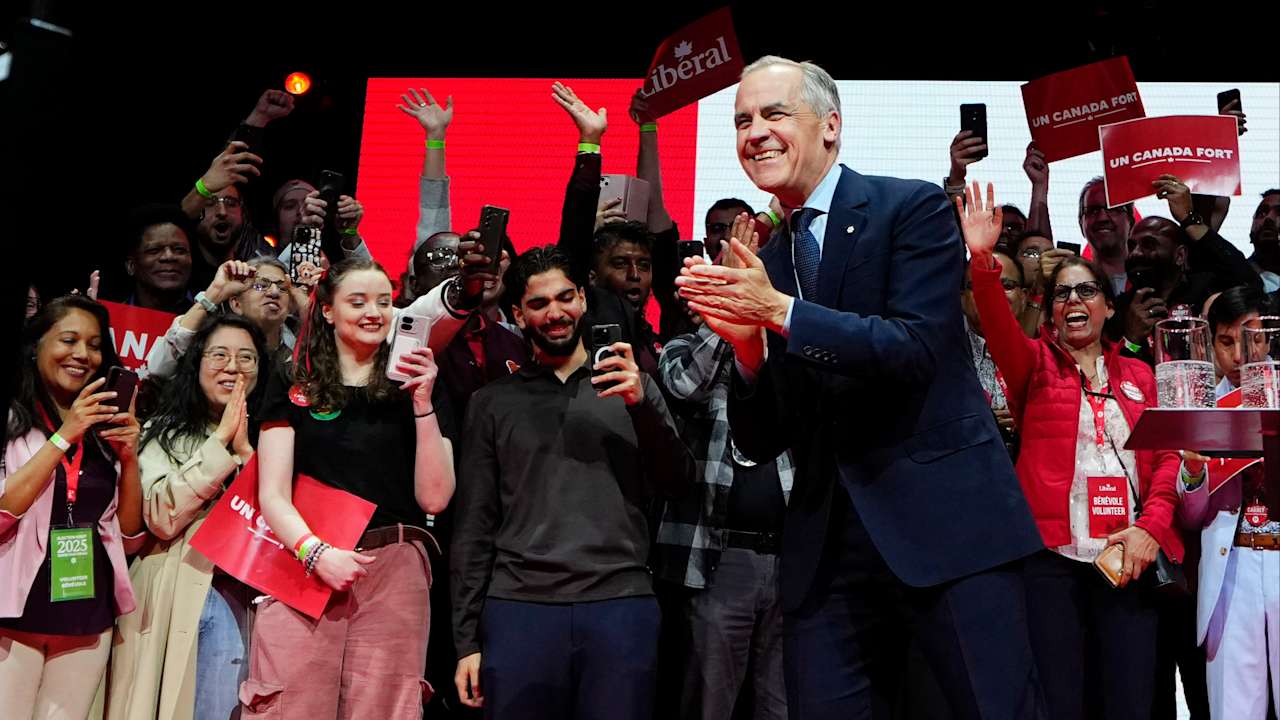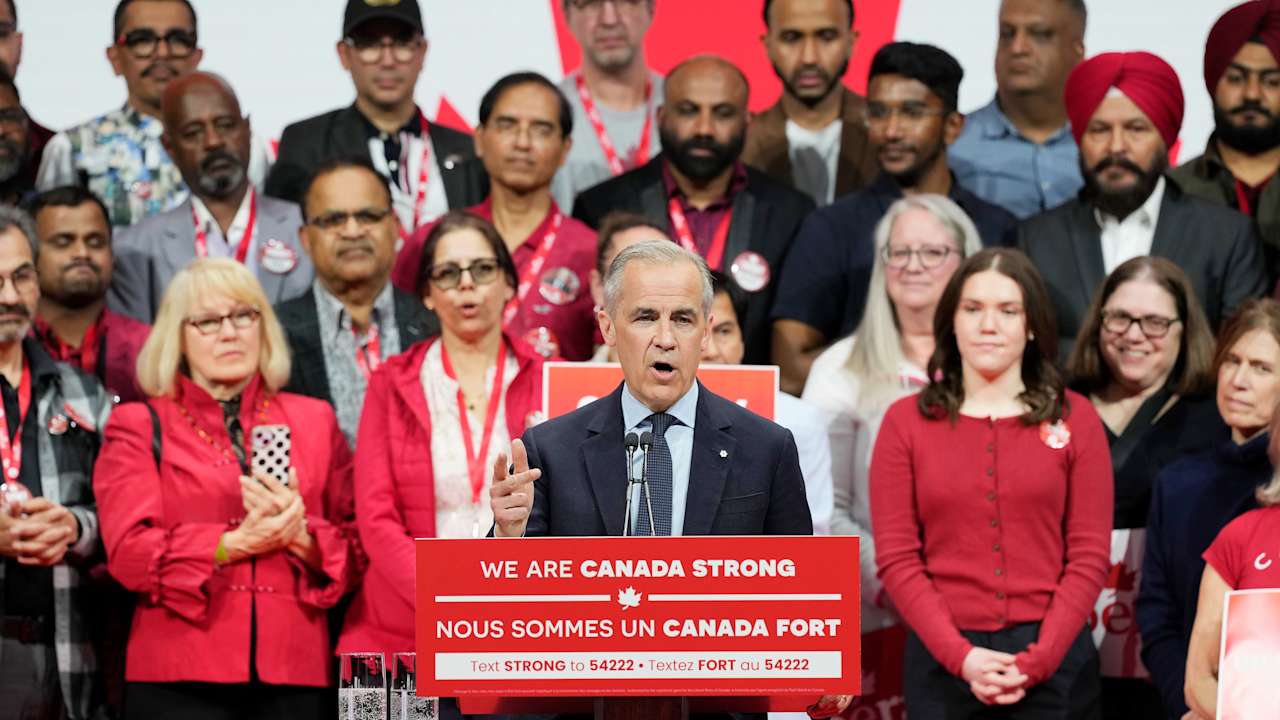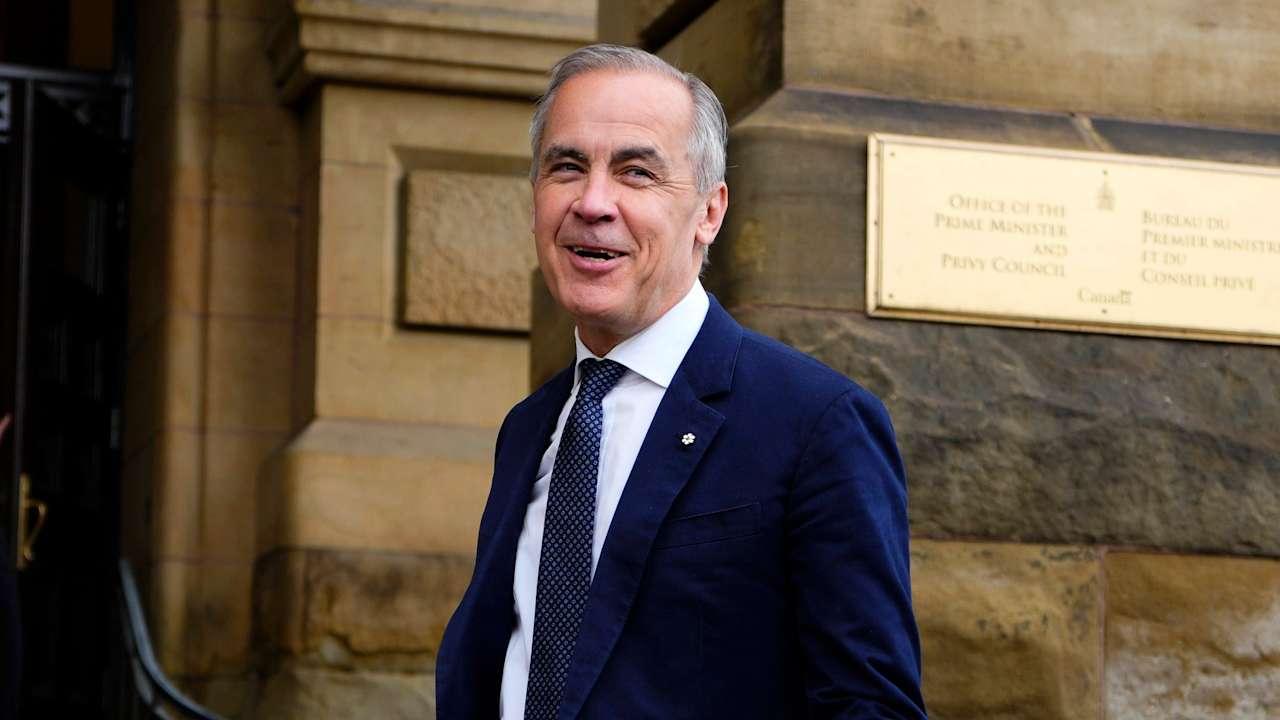Canada has voted former Bank of England Governor Mark Carney and his Liberal Party back into power, after threats from Donald Trump helped boost his campaign. ITV News US Correspondent Dan Rivers reports from Ottawa
Donald Trump has congratulated Canadian Prime Minister Mark Carney on his victory in the country’s election, and the two have agreed to meet in the “near future”.
Carney’s office said the leaders “agreed on the importance” of the two countries working together during a phone call on Tuesday.
Carney’s Liberal Party fell short of winning an outright majority in Parliament on Tuesday, according to public broadcaster CBC, a day after the party scored a stunning comeback victory in a vote widely seen as a rebuke of President Trump.
The vote-counting agency, Elections Canada, finished processing nearly all ballots in an election that could leave the Liberals just three seats shy of a majority, which means they will have to seek help from another, smaller party to pass legislation.
The Liberal party seemed likely to find the extra votes necessary, but it was not clear whether they would come from the progressive party, which backed the Liberals under former Prime Minister Justin Trudeau, or from a separatist party from French-speaking Quebec.

Carney’s rival, populist Conservative leader Pierre Poilievre, was in the lead until Trump took aim at Canada with a trade war and threats to annexe the country as the 51st state.
Poilievre not only lost his bid for prime minister Monday but was voted out of the Parliament seat that he held for 20 years.
In his victory speech, Carney stressed unity in the face of Washington’s threats. He said the mutually beneficial relationship Canada and the US had shared since the Second World War was gone.
“We are over the shock of the American betrayal, but we should never forget the lessons,” he said.
“As I’ve been warning for months, America wants our land, our resources, our water, our country,” Carney added.
“These are not idle threats. President Trump is trying to break us so America can own us. That will never … ever happen. But we also must recognize the reality that our world has fundamentally changed.”
In a statement issued Tuesday, White House spokesperson Anna Kelly said the Canadian election “does not affect President Trump’s plan to make Canada America’s cherished 51st state.”
Carney has only been Canada’s PM for 46 days, but in that time, he has managed to turn around his party’s fortunes and recover from a position in which some pollsters placed his opponents at a 27-point lead.
His opponent, Poilievre, had hoped the election would be a referendum on Carney’s predecessor, Justin Trudeau, who had won three terms and resigned in January.

Playing on Canadians’ growing resentment towards the US President’s threats to make Canada the 51st state, as well as the tariffs he placed on the country, Carney was able to run on a popular anti-Trump platform.
While campaigning, Carney vowed that every dollar the government collects from counter-tariffs on US goods will go toward Canadian workers who are adversely affected by the trade war.
He also said he plans to keep dental care in place, offer a middle-class tax cut, return immigration to sustainable levels and increase funding to Canada’s public broadcaster, the Canadian Broadcasting Corporation.
“Our old relationship with the US is over,” Mark Carney told supporters in his victory speech.
“President Trump wants to break us so that America can own us,” he added – a reference to the US President’s threats to take over Canada as the 51st state.
The Canadian PM promised that when he sits down to speak with his US counterpart they will do so as “two sovereign nations” and with the knowledge that they have “many, many other options than the United States to build prosperity for all Canadians.”

Addressing supporters and conceding defeat, Poilievre vowed to keep fighting for Canadians and their right to an affordable home on a safe street.
“We are cognizant of the fact that we didn’t get over the finish line yet,” Poilievre told his supporters in Ottawa.
“We know that change is needed, but change is hard to come by. It takes time. It takes work. And that’s why we have to learn the lessons of tonight — so that we can have an even better result the next time Canadians decide the future of the country.”
The US President’s vocal support for Poilievre appeared to turn voters away from the Canadian conservative.
Reid Warren, a Toronto resident, said he voted Liberal because Poilievre “sounds like mini-Trump to me.” And he said Trump’s tariffs are a worry.
“Canadians coming together from, you know, all the shade being thrown from the States is great, but it’s definitely created some turmoil, that’s for sure,” he said.
Historian Robert Bothwell said Poilievre appealed to the “same sense of grievance” as Trump, but that it ultimately worked against him.
“The Liberals ought to pay him,” Bothwell said, referring to the U.S. president. “Trump talking is not good for the Conservatives.”
Carney’s party will have to rely on support from smaller parties to remain in power.
The Bloc Québécois, which looked set to finish third, is a separatist party from French-speaking Quebec that seeks independence from Canada.
Trudeau’s Liberals relied on the New Democrats to remain in power for four years, but the progressive party fared poorly on Monday and its leader, Jagmeet Singh, said he was stepping down after eight years in charge.
Follow STV News on WhatsApp
Scan the QR code on your mobile device for all the latest news from around the country





























